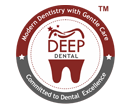Do your gums bleed?
The most common dental disease seen in India, Periodontal Disease (relatively severe)in the age group of 15 years and above is 45% of the population. The range of the severity of the disease varies from a simple gum inflammation to severe infection affecting the supporting bone of the teeth.

What is gum disease?
Periodontal disease is an infection of the tissues support teeth. gum tissue is not attached to the teeth as high as it may seem. There is a very shallow V-shaped crevice called a sulcus between the tooth and gums. Periodontal diseases attack just below the gum line in the sulcus, where they cause the attachment of the tooth and its supporting tissues to break down. As the tissues are damaged, the sulcus develops into a pocket: generally, the more severe the disease, the greater the depth of the pocket. Periodontal diseases are classified according to the severity of the disease. The two major stages are gingivitis and periodontitis. Gingivitis is a milder and reversible form of periodontal disease that only affects the gums. Gingivitis may lead to more serious, destructive forms of periodontal disease called periodontitis.
When do you have a greater risk to develop the disease?
- Tobacco smoking or chewing.
- Systemic diseases such as diabetes.
- Some types of medication such as, steroids, some type of anti-epilepsy drugs, cancer, therapy drugs, some calcium channel blockers and oral contraceptives.
- Bridges that no longer fit properly.
- Crooked teeth.
- Fillings that have become defective.
- Pregnancy or use of oral contraceptives.
When do you know you have a gum disease?
- Gums that bleed easily
- Red, swollen, tender gums
- Gums that have pulled away from the teeth
- Persistent bad breath or bad taste
- Permanent teeth that are loose or separating
- Any change in the way your teeth fit together when you bite
- Any change in the fit of partial dentures
It is possible to have periodontal disease have signs. That is one reason why regular dental checkups and periodontal examinations are very important.
What causes gum disease?
Periodontal (gum) disease is an infection of the tissues surrounding and supporting the teeth. It is a major cause of tooth loss in adults. Because periodontal (gum) disease is usually painless, however, you may not know you have it. Periodontal (gum) disease is caused by plaque, a sticky film of bacteria that constantly forms on the teeth. These bacteria create toxins that can damage the gums. In the early stage of periodontal (gum) disease, called gingivitis, the gums can become red, swollen and bleed easily. At this stage, the disease is still reversible and can usually be eliminated by daily brushing and flossing. In the more advanced stages of periodontal (gum) disease, called periodontitis, the gums and bone that support the teeth can become seriously damaged. The teeth can become loose, fall out or have to be removed by a dentist.
How can I prevent periodontal (gum) disease?
- The good news is that you can help prevent periodontal (gum) disease by taking good care of your teeth every day and having regular dental checkups. Here’s how to keep your teeth and gums healthy:
- Brush your teeth well twice a day.
- This removes the film of bacteria from the teeth. Be sure to use a soft-bristled toothbrush that is in good condition. Toothpastes and mouth rinses containing fluoride strengthen the teeth and help prevent decay.
- Clean between your teeth every day.
- Cleaning between your. teeth with floss or interdental cleaners removes bacteria and food particles from between the teeth, where a toothbrush can’t reach. Early periodontal (gum) disease can often be reversed by daily brushing and flossing. If you use interdental cleaners, ask your dentist how to use them properly, to avoid injuring your gums.
- Eat a balanced diet.
- Choose a variety of foods from the basic food groups, such as breads, cereals and other grain products; fruits; vegetables; meat, poultry and fish; and dairy products, such as milk, cheese and yogurt. Limit between-meal snacks.
- Visit your dentist regularly.
- It is important to have regular dental checkups, and professional cleaning is essential to prevent periodontal diseases.
How can gum or periodontal disease be treated?
In early stage disease a simple scaling would serve the purpose. In case the disease is more advanced you may need a deeper scaling which is called as sub gingival scaling. In very advanced cases a surgery may be needed to treat the diseased gums and underlying tooth supporting bone. In case of periodontal disease the mantra is to prevent it, because prevention is better than cure!

